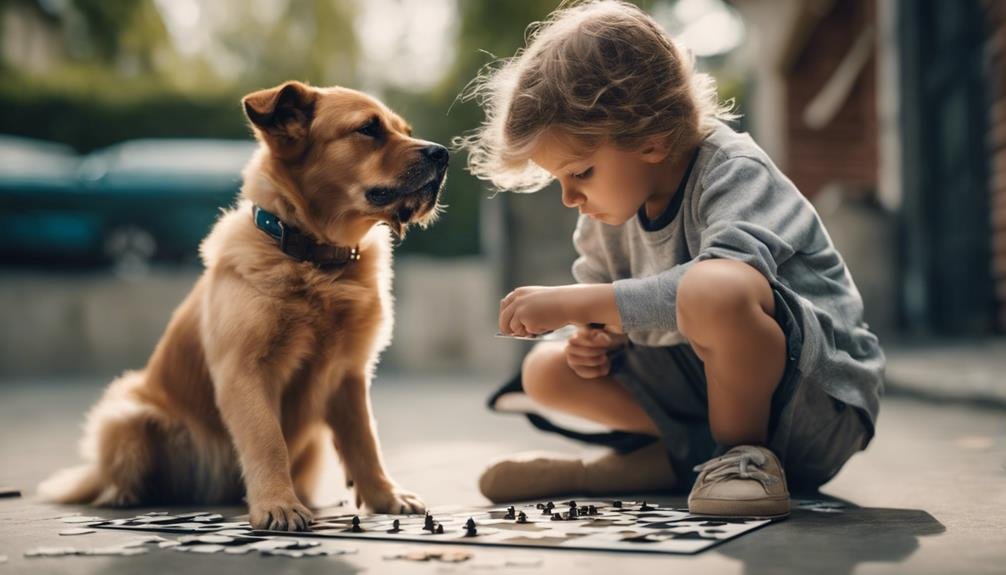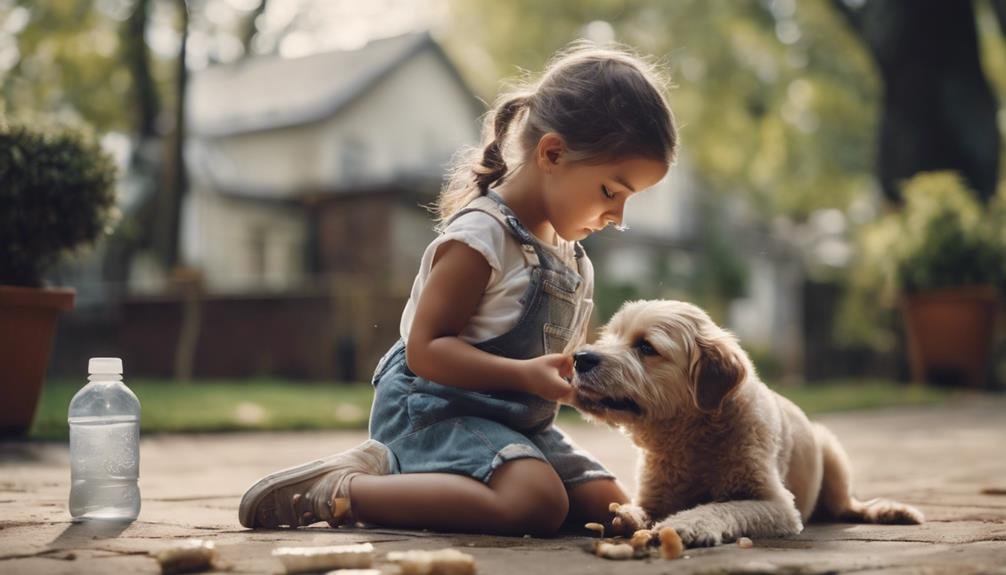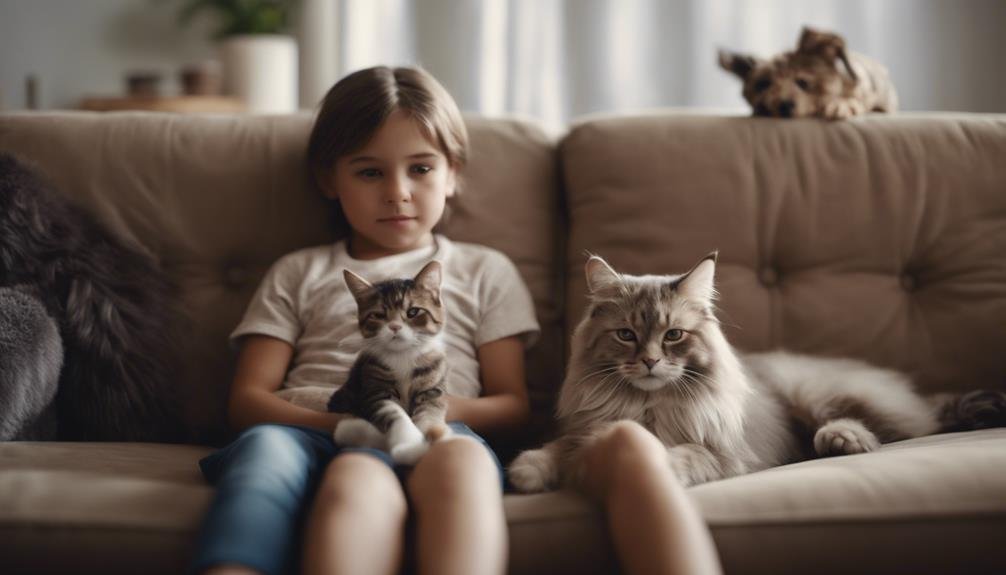"Cherishing Little Steps - A Haven for Baby and Family Journeys"
The Role of Pets in Child Development
Imagine a child steering the ups and downs of life like a ship in a stormy sea, seeking stability and guidance. Just like a lighthouse provides a sense of direction and safety, pets play an essential role in a child's development.
They offer emotional support, teach valuable life lessons, and provide unwavering companionship. But have you ever stopped to ponder the intricate ways in which these furry friends influence a child's growth and well-being?
Let's explore the fascinating world of how pets shape the development of young minds.
Key Takeaways
- Pets enhance empathy, social skills, and cognitive growth in children.
- Interaction with pets boosts mental and physical health, promoting overall well-being.
- Caring for pets instills responsibility, accountability, and emotional support in children.
- Pets provide companionship, security, and emotional resilience, aiding in child development.
Emotional Development
When it comes to emotional development, pets play an essential role in fostering empathy and compassion in children. The attachment formed between a child and their pet can greatly impact the child's ability to regulate their behavior and emotions. Studies have shown that children who've pets often exhibit higher levels of empathy and compassion towards others. This is because caring for a pet requires the child to be attentive to the pet's needs, thereby promoting a sense of responsibility and nurturing behavior.
Having a pet can help children develop self-awareness and emotional regulation. Interacting with a pet can provide a safe space for children to express and process their emotions. For example, when a child is feeling upset or anxious, spending time with their pet can help them calm down and regulate their emotions effectively. Pets offer unconditional love and support, which can boost a child's self-esteem and emotional well-being. Pets serve as valuable companions in a child's emotional development journey.
Social Skills Enhancement
During their formative years, children can greatly enhance their social skills through interactions with pets. Having a furry friend around can provide valuable communication practice opportunities for kids. Pets are non-judgmental listeners, allowing children to express themselves freely without fear of criticism. By talking to their pets, children learn important social cues such as recognizing emotions and responding appropriately.
Additionally, pets can facilitate peer interaction in children. When kids play with their pets in the presence of others, it can help them develop essential social skills like sharing, taking turns, and cooperating. These experiences with pets can translate into improved social interactions with their peers. Additionally, caring for a pet teaches children about responsibility and empathy, which are crucial for emotional regulation.
Cognitive Growth

To foster cognitive growth in children, the presence of pets in their lives can play a significant role. Interacting with pets can enhance problem-solving skills as children often need to figure out how to communicate with and understand their animal companions. This process of decoding non-verbal cues and responding appropriately can boost cognitive abilities related to understanding complex situations. Additionally, having pets around can improve memory retention as children learn to remember feeding schedules, training commands, or specific likes and dislikes of their pets.
Critical thinking is another cognitive skill that can be sharpened through interactions with pets. Children may need to think creatively to entertain or train their pets effectively, encouraging them to analyze different scenarios and come up with innovative solutions. Further, the presence of pets can help improve concentration and focus in children. Whether it's teaching a pet a new trick or simply observing their behavior, children often need to pay close attention, which can translate into better concentration skills in other areas of their lives.
Empathy Building
Interacting with pets can greatly contribute to the development of empathy in children, fostering a deeper understanding of emotions and perspectives beyond their own. Through empathy training facilitated by the animal connection, children learn to recognize and respond to the needs and feelings of their pets. This process extends to humans, enhancing their emotional intelligence and ability to empathize with others.
The bond formed between a child and their pet is a unique and powerful relationship that nurtures empathy. When a child cares for a pet, they develop a sense of responsibility and compassion, which are fundamental aspects of empathy. This emotional connection established through pet bonding allows children to experience firsthand the impact of their actions on another being, promoting kindness and understanding.
Studies have shown that children who grow up with pets tend to exhibit higher levels of empathy and pro-social behaviors. By engaging with their pets, children learn to communicate non-verbally, interpret body language, and respond appropriately to different emotional cues. This hands-on experience enriches their capacity for empathy and lays a foundation for building meaningful relationships based on understanding and compassion.
Responsibility Development

Developing a sense of responsibility through caring for a pet is an essential aspect of a child's character growth and maturity. By assigning tasks related to the pet's well-being, such as feeding, grooming, or taking them for walks, children learn the importance of task completion. Through these responsibilities, children also enhance their decision-making skills. For instance, they must decide on the appropriate amount of food or the best time for a walk, which encourages critical thinking and consideration of others' needs.
Completing tasks associated with pet care instills a sense of accomplishment in children, boosting their self-esteem and confidence. Additionally, it helps them understand the consequences of their actions; if they forget to feed the pet, they learn about accountability and the impact of neglect. These practical experiences lay a solid foundation for developing a responsible and conscientious individual, preparing them for future challenges and obligations.
Companionship Benefits
Caring for a pet not only fosters responsibility but also provides invaluable companionship benefits for a child's emotional development. The bond between a child and their furry friend goes beyond mere companionship; it plays an important role in shaping the child's overall well-being.
- Mental Health: Studies have shown that children who've pets tend to experience lower levels of stress and anxiety. The presence of a pet can act as a source of comfort and emotional support for children, promoting positive mental health outcomes.
- Behavior Modification: Interacting with a pet can help children learn empathy, compassion, and patience. Through caring for their pet, children develop a sense of responsibility and understanding of the needs of others, leading to positive behavior changes.
- Emotional Regulation: Pets provide a safe and non-judgmental space for children to express their emotions. This can help children learn to regulate their feelings and develop healthy coping mechanisms.
- Social Skills: Having a pet can improve a child's social skills by providing opportunities for interactions with others. Whether it's talking about their pet with friends or engaging in pet-related activities, children can enhance their communication and socialization skills.
Stress Reduction

Pets have been shown to reduce stress levels in children, benefiting their overall well-being. The presence of a beloved pet can offer significant anxiety relief for children, creating a calming effect that helps in managing stress.
Studies have demonstrated that interacting with pets can lead to a decrease in cortisol levels, the hormone associated with stress. When a child spends time playing or cuddling with their pet, the bond formed can contribute to mood improvement, fostering feelings of happiness and security.
This emotional connection with a pet can serve as a source of comfort during challenging times, providing a sense of companionship that eases worries and promotes relaxation. The unconditional love and nonjudgmental companionship offered by pets create a safe space for children to express their emotions freely, reducing pent-up stress and tension.
Overall Well-being
Enhancing a child's overall well-being can be greatly influenced by the presence of a beloved pet in their life. Having a furry friend around not only brings joy but also offers numerous benefits that contribute to your well-being:
- Mental Health: Interacting with pets has been shown to reduce stress, anxiety, and feelings of loneliness. The unconditional love and companionship provided by a pet can uplift your mood and help you cope with challenges more effectively.
- Physical Health: Engaging in activities with pets, such as playing fetch or going for walks, encourages physical exercise. This active lifestyle can improve your overall physical health, boost immunity, and reduce the risk of obesity.
- Emotional Support: Pets are excellent listeners and can provide a sense of security and comfort, especially during times of distress or uncertainty.
- Social Development: Caring for a pet fosters empathy, responsibility, and social skills in children, promoting positive relationships and enhancing overall well-being.
Incorporating a pet into your family can have a profound impact on your overall well-being, nurturing a holistic approach to health and happiness.
Frequently Asked Questions
How Can Pets Help Children Cope With Grief and Loss?
When grieving, pets offer comfort through their unconditional love and presence. Pet therapy can assist in healing by providing emotional support and companionship, helping children cope with loss by understanding and processing their emotions.
Can Having a Pet Help Children With Sensory Processing Issues?
Having a pet can greatly benefit children with sensory processing issues. The sensory stimulation and therapeutic bond they provide can aid in emotional regulation and sensory integration. Pets offer comfort and support in a unique way.
Are There Any Studies Showing a Link Between Pet Ownership and Academic Performance in Children?
You think owning a pet might boost your grades? Surprisingly, research suggests that pet therapy and emotional support from pet ownership can positively impact academic success in children. So, maybe your furry friend is a study buddy after all!
What Are Some Ways Pets Can Help Children With Anxiety Disorders?
When dealing with anxiety disorders, pets can provide emotional support and stress relief. Through pet therapy, coping strategies can be developed. Their presence can offer a sense of calmness and companionship, aiding in anxiety management.
Are There Specific Types of Pets That Are Better Suited for Children With Special Needs?
When addressing the needs of children with special needs, specific types of pets like therapy dogs, therapy cats, emotional support animals, and service animals can offer tailored support and companionship that cater to their unique requirements.
Conclusion
To summarize, the role of pets in child development is undeniable. Research supports the idea that having a pet can positively impact emotional, social, cognitive, and empathetic growth in children.
By taking care of a pet, children learn responsibility and develop companionship skills. Pets also provide a source of comfort, reducing stress and improving overall well-being.
So, if you're considering getting a pet for your child, know that you're not just adding a furry friend to the family, but also a valuable tool for their development.


